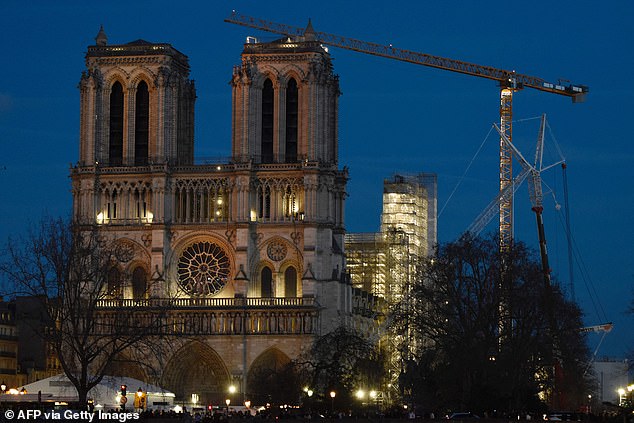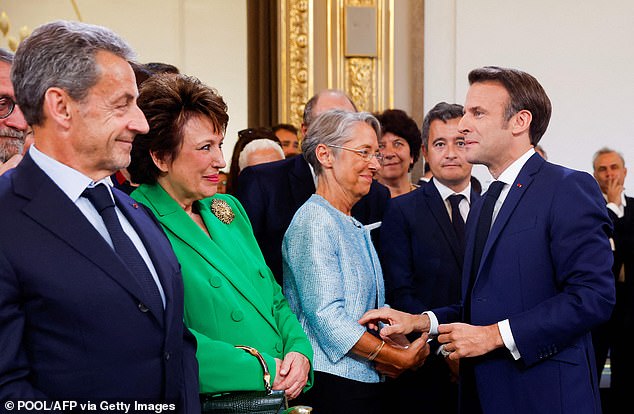Brigitte Macron backed a ‘phallus with golden balls’ as the new spire for Notre Dame cathedral
>
Brigitte Macron proposed an ‘erect phallus with golden balls’ as the new spire for the Notre Dame cathedral in Paris, the former culture minister has claimed.
Roselyne Bachelot, 76, recounted in her memoirs how she was shocked when the First Lady presented her risqué plans for the iconic landmark over lunch.
After fire ravaged the iconic gothic cathedral in 2019, Emmanuel Macron held an international competition to redesign the spire and roof.
But this sparked a heated row, with some wanting the 850-year-old building restored identically to its former glory, and others wanting a modern design.

Brigitte Macron proposed a ‘phallus with golden balls’ as the new spire for the Notre Dame cathedral in Paris, the former culture minister has claimed
Bachelot, who was sacked by Macron last year, rejected the modernist proposals, which included a carbon fibre roof covered with gold leaf, a greenhouse, an open ceiling and a roof built entirely of stained glass.
The former minister said in her new book 682 Days recounting her time in office, that the Elysée Palace under Macron’s instruction were pushing for outlandish new plans, which she tried to rebuff.
She said: ‘I do not forget the first meeting of the National Commission for Architecture and Heritage where I affirmed on July 9 that the spire of Notre Dame must be built identically to respect the Venice Charter.
‘When I returned to the Rue de Valois (Culture Ministry), the staff are under stress: the Elysée is dreaming of an “architectural gesture” and accuses me of doing just as I please. Well it won’t be the last time.
‘I do not regret this insubordination when, having lunch with Brigitte Macron a few days later, she shows me a project topped with a sort of erect phallus with its base surrounded with golden balls.’


After fire ravaged the iconic gothic cathedral in 2019, Emmanuel Macron held an international competition to redesign the spire and roof


The cathedral is pictured on December 29 as reconstruction continues on the iconic Parisian landmark
In the end, the National Assembly ruled that the restoration must ‘preserve the historic, artistic and architectural interest of the monument’.
The cathedral’s spire was in fact a later addition to the building, added in the 19th century to replace the original which had been weakened and bent by wind.
Officials want the monument to be reopened to the public by December 2024, with restoration fully completed by the following year.
Michel Picaud, president of the charity Friends of Notre Dame de Paris, said last month: ‘The work is proceeding extremely well.
‘What has been decided is to restore the cathedral to the state she was in before the fire and … the schedule seems very solid.’


Roselyne Bachelot (pictured second left) recounted in her memoirs how she was shocked when the First Lady presented her risqué plans


The cathedral’s spire was in fact a later addition to the building, added in the 19th century to replace the original which had been weakened and bent by wind
Construction on the roof and spire will begin this year.
Standing on the Île de la Cité in the middle of the River Seine, Notre-Dame is a medieval Catholic cathedral consecrated to the Virgin Mary that was constructed from 1163–1260 under the Bishop of Paris Maurice de Sully.
The limestone-fronted structed is considered to be not only a symbol of Paris but also one of the finest examples of French Gothic architecture, resplendent with its colourful rose windows and pioneering vaults and buttresses.
Its wooden roof and spire was razed after the fire — thought caused by an electrical malfunction or a lit cigarette butt linked to ongoing renovation work — took hold in the attic on the evening of April 15, 2019.
The fire was extinguished fifteen hours later. Although there were no fatalities as a result of the accident, three emergency service personnel were injured and some works of art within suffered smoke damage.
Fortunately, the cathedral’s stone ceiling — above which the lead-covered wooden roof had stood — protected much of the interior, and Notre-Dame’s altar, rose windows and pipe organs survived little-to-no damage.
